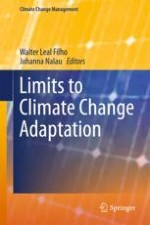2018 | OriginalPaper | Chapter
6. Limits to Climate Change Adaptation in Zimbabwe: Insights, Experiences and Lessons
Author : Nelson Chanza
Published in: Limits to Climate Change Adaptation
Publisher: Springer International Publishing
Activate our intelligent search to find suitable subject content or patents.
Select sections of text to find matching patents with Artificial Intelligence. powered by
Select sections of text to find additional relevant content using AI-assisted search. powered by
